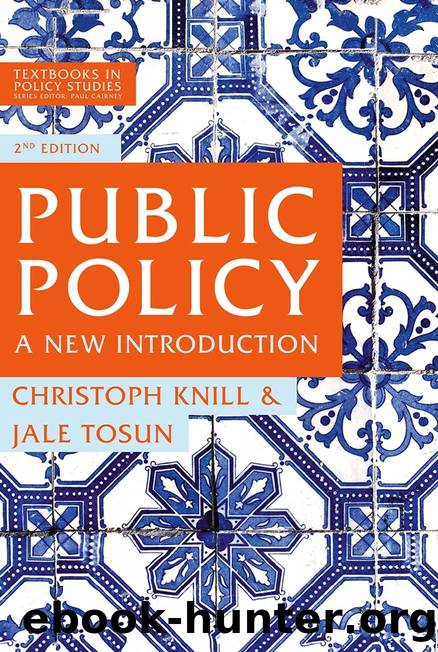Public Policy by Christoph Knill

Author:Christoph Knill [Knill, Christoph]
Language: eng
Format: epub
Tags: political science, General, History & Theory, Public Affairs & Administration, Public Policy, Economic Policy, Social Policy
ISBN: 9781137573315
Google: qIvgDwAAQBAJ
Publisher: Red Globe Press
Published: 2020-04-30T00:03:24.117522+00:00
Likewise, scientific evaluation is part of the literature on evidence-based policy-making (for overviews, see Oliver et al. 2014; Wellstead et al. 2018), which we discuss in detail later in this chapter. This literature concentrates on how policy-makers make use of evidence when addressing policy problems. Cairney (2016) argues that policy-makers do not consider all evidence supplied on policy problems, but rather use the information provided to define their goals and priorities (the ârationalâ shortcut), or they make decisions quickly without paying attention to the evidence by following their beliefs and emotions (the âirrationalâ shortcut). The main implication from this perspective, which brings the political characteristic of scientific evaluation to the fore, is that scientists have to become policy entrepreneurs to increase the chances that the scientific evidence will be taken up by policy-makers (see Cairney 2018). This conclusion is underlined by an empirical study by Newman et al. (2017), which shows that policy-makers have difficulty in accessing scientific evidence. Often policy-makers rely on âbest practicesâ rather than insights provided by scientific evaluation, which is problematic since they feature place-bound characteristics and do not lend themselves to simple policy emulation (Nagorny-Koring 2019). Therefore, if research evidence is to guide policy-making, it will need to be presented in a concise, straightforward and non-technical fashion.
Economic Evaluation
Economic evaluations involve the identification, measurement, evaluation and then comparison of the costs (inputs) and benefits (outcomes/impacts) of two or more alternative policies. The costs and consequences of alternative interventions or scenarios are compared to find the best use of scarce resources, thus focusing on the efficiency of a policy. This approach is predominantly used for administrative evaluations and differs according to scope and intent. It can have a very narrow focus, in which evaluators are only concerned about the resource consequences for the implementing agency (for instance, in the case of child benefits, for the ministry for family affairs or its equivalent). In these evaluations, a new intervention which shifts costs to another agency may be preferred. Alternatively, economic evaluations can examine wider social costs. In these evaluations, a new intervention that shifts relative costs but does not reduce total costs may not be desirable.
A country that has adopted economic evaluation as a formal tool for guiding the design of health policies is South Korea. In 2001, it used economic evaluations for decisions on pricing and the extent of health insurance coverage of new medical technologies, encompassing pharmaceuticals, equipment and diagnostic technology, that were necessary within the context of amending the act on national health insurance (Yang et al. 2008: 183). The number of Asian countries preparing for the adoption of economic evaluation for making health policy is rising: China, Taiwan and Thailand have already elaborated their own guidelines in this policy area (Yothasamut et al. 2009).
The three main types of economic evaluation are costâbenefit analysis, cost-effectiveness analysis and costâutility analysis. They all address efficiency issues with regard to social interventions. Costâbenefit analysis involves weighing the total expected costs against the total expected benefits of one or more actions in order to choose the best option.
Download
This site does not store any files on its server. We only index and link to content provided by other sites. Please contact the content providers to delete copyright contents if any and email us, we'll remove relevant links or contents immediately.
Zero to IPO: Over $1 Trillion of Actionable Advice from the World's Most Successful Entrepreneurs by Frederic Kerrest(4573)
Machine Learning at Scale with H2O by Gregory Keys | David Whiting(4313)
Never by Ken Follett(3957)
Harry Potter and the Goblet Of Fire by J.K. Rowling(3859)
Ogilvy on Advertising by David Ogilvy(3622)
Shadow of Night by Deborah Harkness(3368)
The Man Who Died Twice by Richard Osman(3080)
Book of Life by Deborah Harkness(2939)
The Tipping Point by Malcolm Gladwell(2925)
Will by Will Smith(2920)
Purple Hibiscus by Chimamanda Ngozi Adichie(2855)
0041152001443424520 .pdf by Unknown(2846)
My Brilliant Friend by Elena Ferrante(2831)
How Proust Can Change Your Life by Alain De Botton(2814)
How to Pay Zero Taxes, 2018 by Jeff A. Schnepper(2655)
Hooked: A Dark, Contemporary Romance (Never After Series) by Emily McIntire(2555)
Rationality by Steven Pinker(2366)
Can't Hurt Me: Master Your Mind and Defy the Odds - Clean Edition by David Goggins(2342)
Borders by unknow(2315)
